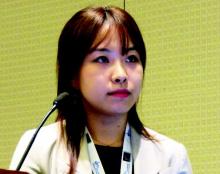LAKE BUENA VISTA, FLA. – Ethanol ablation is just as effective as radiofrequency ablation for cystic thyroid nodules, resulting in similar volume reduction and similarly improving symptomatic and cosmetic outcomes at 6 months.
Radiofrequnecy ablation (RFA) did have a slight edge over ethanol injection (EA) in therapeutic response, Dr. Hye Sun Park said at the International Thyroid Conference. But because ethanol ablation is easier and less expensive, she recommended that it be considered as first-line therapy for these lesions.
Dr. Park of the University of Ulsan, Asan Medical Center in Seoul, South Korea, reported a trial of 46 patients, mean age 50 years old, with benign cystic thyroid nodules who were randomized to the two treatments. Patients randomized to ethanol, however, had significantly larger-volume lesions (14.7 vs. 8.6 mL), and symptom scores. Cosmetic scores and nodule vascularity were similar.
RFA was performed with an 18-gauge monopolar, internally cooled electrode with a 1-cm active tip, using the moving shot technique. Patients undergoing EA first had fluid removed from the nodules using a 16-gauge needle. Ablation consisted of an injection of 99% ethanol into the cystic space, which was removed after 2 minutes.
The primary outcome was nodule volume at 6 months. Secondary outcomes were postprocedural pain and complications, Dr. Park said at the meeting held by the American Thyroid Association, Asia-Oceania Thyroid Association , European Thyroid Association, and Latin American Thyroid Society.
At follow-up, the volume reductions were similar in RFA and EA (87.5 vs. 82.4 ml). The therapeutic success rate was 100% for patients who had RFA and 92% for those who had EA. Two patients in the EA group had major bleeding from the nodule, which interrupted the procedure; they later had a successful RFA. There were no complications in the RFA group.
There was only one major complication during follow-up: One patient who received EA complained of voice change, which resolved spontaneously by 2 months after ablation.
Dr. Park had no financial disclosures.


